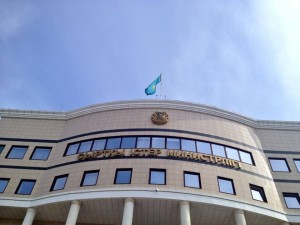 ASTANA – The Ministry of Foreign Affairs of Kazakhstan held a briefing on March 6 concerning religious freedom in Kazakhstan for the diplomatic corps and representatives of accredited international organisations.
ASTANA – The Ministry of Foreign Affairs of Kazakhstan held a briefing on March 6 concerning religious freedom in Kazakhstan for the diplomatic corps and representatives of accredited international organisations.
At the briefing, Foreign Minister Erlan Idrissov and Chairman of the Agency for Religious Affairs Marat Azilkhanov spoke about the religious climate in Kazakhstan and the country’s compliance with the international human rights and democracy obligations it has undertaken.
The briefing was attended by Representatives of Kazakhstan’s civil society specialising in religious freedom, as well Kazakhstan’s religious leaders also attended the briefing.
In his remarks, Idrissov noted that Kazakhstan has representatives of more than 120 nationalities living peacefully in the country and following many different religions.
Freedom of religion is a reality in Kazakhstan and is guaranteed by the Constitution, as well as by other laws, the minister added. The 2011 Law on Religion fully complies with the country’s international obligations and creates a healthy environment for religious organisations, which number more than 3,400 today.
“We are open to all. In Kazakhstan, followers of all faiths are absolutely equal and they have equal opportunity to practice their faith. Critical statements about this or that representative of Christianity, Islam, Buddhism or other faiths being subject to discrimination based on religion are baseless,” Idrissov noted. “We know of a few cases of litigation involving representatives of certain denominations. I assure you that all of these cases involve a violation of our laws. In most cases, these are issues related to compliance with the rules of registration. We respect the views and feelings of all followers of different faiths, but we also demand respect for the laws of Kazakhstan.”
Azilkhanov presented a report on the state of freedom and religion in Kazakhstan. The report was meant to demonstrate transparency in Kazakhstan, discuss issues of religious freedom and confirm that Kazakh legislation pertaining to religious freedom is consistent with international standards.
Azilkhanov noted the new 2011 law on religion was necessary to curb the activities of some elements that use religion for destructive and extremist purposes.
“All religious associations are equal before the law in the country, and freely conduct religious gatherings. The number of missionary organisations is growing. No missionaries were denied permission to operate in the re-registration process,” the head of the agency said.
According to Kazakhstan’s foreign ministry, The Chief Rabbi of Kazakhstan Yeshaya Cohen, Bishop of Kaskelen Gennady and Apostolic Nuncio, Vatican Ambassador Miguel Buendia commented on remarks by the Minister of Foreign Affairs and the Chairman of the Agency for Religious Affairs and expressed support for the country’s leadership policy, including regarding religion, which is aimed at ensuring public safety. They noted that the timely adoption of the new law on religion contributed to the establishment of equal and favourable conditions for confessions. The law presents opportunities for activities that contribute to growth in the number of religious organisations in Kazakhstan.
The religious leaders expressed their willingness to share experiences to ensure the law’s proper implementation.
Participants of the event were given a bilingual report and literature about Kazakhstan’s efforts to guarantee religious freedom.
